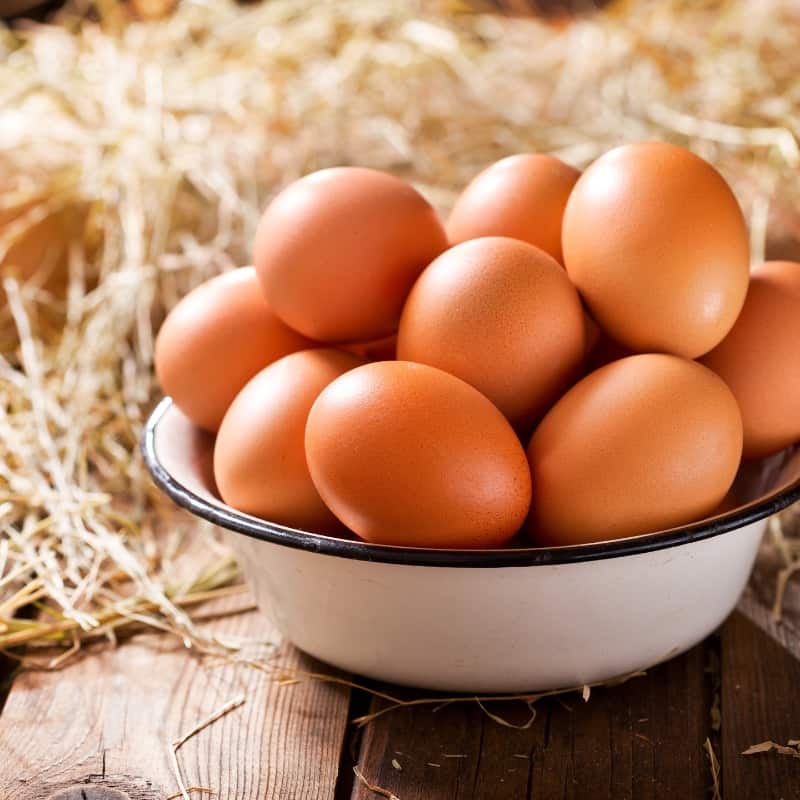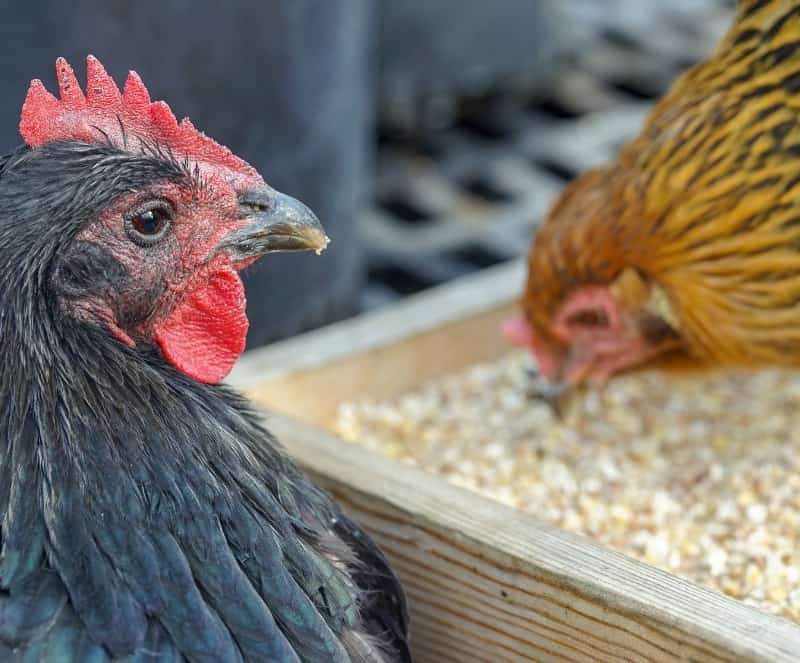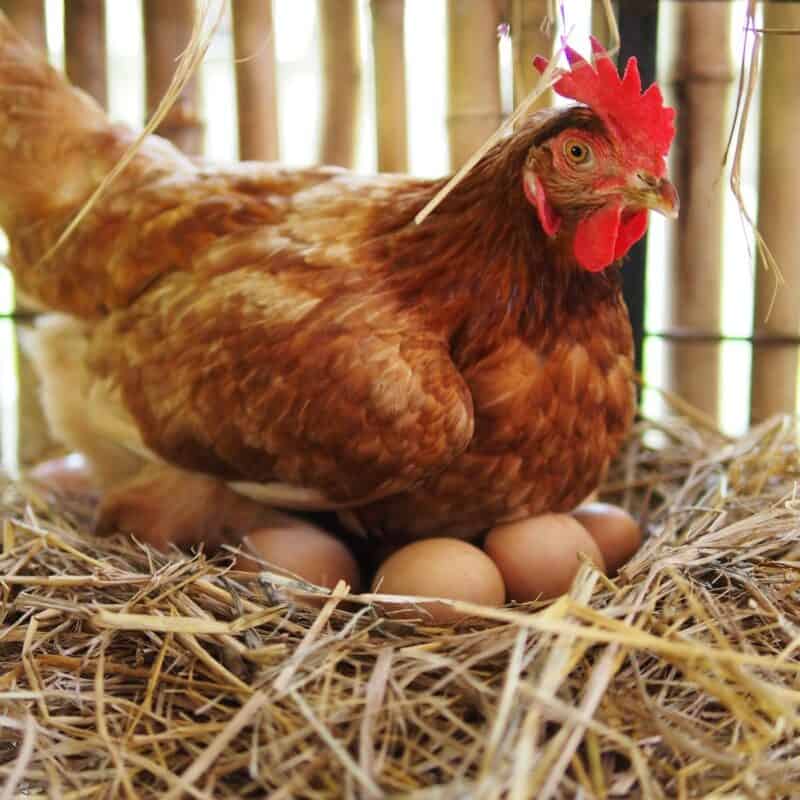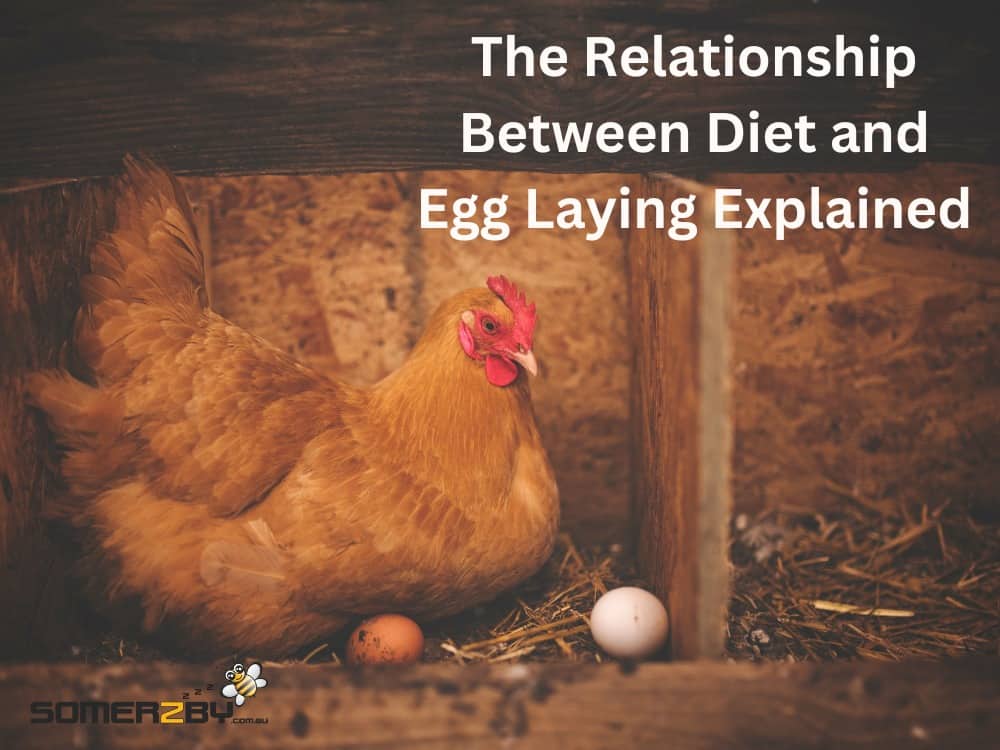Chickens, Info Guides
Relationship Between Diet and Egg Laying Explained
Comprehending the relationship between diet and egg laying is critical for keeping your chickens in good health and maximising their egg output. This blog post will delve into the specific nutritional requirements necessary for successful egg laying.
We’ll explore how a balanced diet can impact not only the quantity, but also quality of eggs produced. Additionally, we’ll discuss the potential benefits that feeding supplements can offer to you and your flock.
Poor nutrition has detrimental effects on egg production; we’ll examine these in detail to help you prevent such issues. Lastly, we provide strategies for optimising egg production through dietary adjustments.
By understanding the relationship between diet and egg laying, you’re investing in healthier hens and better quality eggs.
Nutrition for Egg-Laying Animals
The relationship between diet and egg laying reveals that both chickens and ducks require a well-balanced diet to ensure the production of eggs of superior quality.
They require protein for feather development and overall health, fats for energy, and carbohydrates for regulating body temperature.
Vitamins and minerals like A, D & E as well as calcium are also essential for strong shell formation.
For the best egg-laying chickens, check out Somerzby’s guide.

Protein Is A Must-Have
For animals that are engaged in egg-laying, protein can be likened to a gym membership that is essential for the development and maintenance of muscle mass.
Just like individuals who rely on regular workouts to build strength, egg-laying animals require an adequate protein intake in their diet to support consistent egg production.
Ideally, their diet should consist of approximately 16-18% protein content, ensuring the necessary amino acids are available for optimal egg-laying performance.
By prioritising protein-rich nutrition, these animals can maintain their muscular health and sustain a steady supply of eggs.
To ensure your chicken’s protein needs are met, it is recommended to check the protein content of commercial layer feed to ensure it contains sufficient amounts of protein.
Fats and Carbs: The Dynamic Duo
Fats and carbohydrates work synergistically to provide vital nutrition to egg-laying chickens.
Fats act as a concentrated source of energy, supporting the hen’s metabolic functions and egg production, while aiding in the absorption of fat-soluble vitamins essential for reproductive health.
Meanwhile, carbohydrates provide readily available energy that efficiently fuels growth, maintenance, and daily activities as well as regulating body temperature during cold weather conditions.
Striking a balance between fats and carbohydrates in the diet ensures optimal energy and nutrition, ultimately promoting healthy egg laying and overall well-being in chickens.
Vitamins and Minerals: The Unsung Heroes
Vitamins and minerals play a crucial role in the relationship between diet and egg laying, often going unnoticed yet serving as the unsung heroes.
Without these essential nutrients, eggshells would lack the strength they need. Key vitamins like A, D, and E, along with important minerals like calcium, are vital components in an animal’s diet, supporting the formation of robust and resilient eggshells.
By recognising the significance of these vitamins and minerals, we can appreciate their contribution to the overall health and quality of the eggs we enjoy.
A Balanced Diet is Egg-cellent
Feeding your pets a well-balanced diet is the key to consistent egg production. Check out Somerzby’s blog for more information on how balanced chicken feed can positively impact egg-laying. Consult with a vet or poultry specialist prior to making any major dietary changes for your pet.
Somerzby has some great recommendations on the best diet to feed your chicken.
Impact of Diet on Egg Quality
Egg-cellent eggs start with a healthy diet. The quality of eggs produced by egg-laying animals is directly related to the quality of their diet. A healthy diet is essential for both optimal growth and high-quality egg production.
Dietary Components & Their Effects
Protein, carbs, fats, vitamins, and minerals are all essential components for optimal egg production. Protein helps form egg white, while fats contribute to yolk development. Carbs provide energy for laying eggs, and vitamins and minerals ensure overall health and shell strength.
The Role Of Feed Ingredients
Choose your feed ingredients wisely. Studies show that corn can lead to brighter yolks, while flaxseed increases the omega-3 fatty acid content. The role of feed ingredients is paramount in determining the quality and quantity of eggs laid by chickens.
A well-balanced diet incorporating essential nutrients, such as protein, vitamins, and minerals, not only ensures healthy hens but also contributes to the formation of strong eggshells, vibrant yolks, and overall superior egg quality.
Variation In Egg Size & Colour Due To Diet
Did you know that even your pet chicken’s diet could affect egg size and colour?
Chickens fed with higher protein diets tend to lay larger eggs, and certain dietary elements influence shell coloration patterns too.
Investing time into learning about proper feeding practices will ultimately benefit both you and your beloved pets. So, feed them well and enjoy those egg-cellent eggs.
Benefits Of Feeding Supplements
Boost your chicken’s health and egg laying productivity with dietary supplements. They enhance nutrition intake and improve the quality and quantity of eggs produced.
Vitamin Supplements:
- Vitamin A: Vital for growth, reproduction, and maintaining healthy skin and feathers.
- Vitamin D: Is the most common deficiency in chickens. It is essential in the relationship between diet and egg laying. It aids in calcium absorption, contributing to strong eggshells.
- Vitamin E: Promotes immune system function, ensuring healthier hens that lay more consistently.
Mineral Supplements:
- Calcium: Egg shells are made from approximately 90% calcium, so it is crucial for producing strong shells. Deficiency can lead to soft-shelled or shell-less eggs.
- Phosphorus: Phosphorus plays a vital role in supporting egg laying in chickens. As an essential mineral, phosphorus contributes to various physiological processes related to egg production, it aids in the formation of strong eggshells by working in tandem with calcium. Providing an adequate phosphorus supply through a balanced diet helps promote consistent egg laying and maintains the overall well-being of chickens.
- Zinc: Supports feather growth and helps boost their immune system to prevent common diseases.
Supplementation can help fill any nutritional gaps in your pet’s diet, leading to improved egg production.
Providing appropriate mineral supplements can help ensure that hens have the necessary mineral reserves to support consistent and high-quality egg laying.
Before introducing any new dietary supplements, it is advisable to consult a veterinarian. Each animal has unique dietary requirements based on factors such as age, breed, size, and more.
Seeking professional guidance ensures that the supplements are appropriate and beneficial for your specific pet’s needs. For a comprehensive guide on the best 10 egg-laying chicken breeds, be sure to check out this blog.

Effects of Poor Nutrition On Egg Production
Bad food, bad eggs. It’s that simple. Animals that lay eggs require certain nutrients to produce viable eggs; otherwise, the output can be reduced, shells weakened and health issues may arise.
Protein is essential for egg development and shell structure. Without enough protein, you’ll end up with small eggs and thin shells. And don’t forget about calcium – hens need it to form strong eggshells. Without it, you’ll get weak or soft-shelled eggs.
Vitamin Deficiencies
Vitamin deficiencies can have a significant impact on chicken egg production. A lack of essential vitamins, such as vitamin D, vitamin E, and the B-complex vitamins, can disrupt the hen’s reproductive system and hinder egg development.
Vitamin deficiencies may lead to reduced egg production, smaller egg size, and compromised egg quality, including thinner shells and paler yolks.
It is crucial to provide a well-balanced diet that meets the vitamin requirements of chickens to ensure optimal egg production and maintain the overall health and vitality of the flock.
Fats
Fats provide energy for laying hens, but too much can lead to obesity and decreased productivity. Keep it balanced. Poor nutrition can also cause health issues like feather pecking and obesity, which can shorten your pet’s lifespan.
Do your research and make sure your pets are getting the right diet for healthy living and productive laying cycles. Check out Somerzby’s blog for more information.

Get Enough Protein
Protein is an essential building block for the development of eggshells, which primarily consist of calcium carbonate. Adequate protein intake helps hens efficiently utilise calcium from their diet, ensuring the formation of strong and durable eggshells.
Additionally, protein is essential for the overall health and reproductive functions of the hen, promoting optimal hormone production and supporting the development of high-quality eggs.
A lack of protein can lead to decreased egg output and poor shell quality.
Balance is Key
When it comes to the relationship between diet and egg laying, balance is key. Providing a well-rounded and nutritionally balanced diet to hens is essential for optimal egg production, ensuring that they receive the necessary nutrients for healthy growth, robust eggshells, and consistent laying patterns.
Mix it up with grains, veggies, fruits, and proteins to meet all their nutritional needs.
Vitamin Boost
Giving your pet a vitamin boost is a vital component within the relationship between diet and egg laying. Vitamins play a crucial role in supporting overall health, reproductive functions, and egg development.
By ensuring that your flock receives a balanced diet rich in essential vitamins, such as vitamin D, vitamin E, and the B-complex vitamins, you can enhance their vitality and encourage consistent egg laying.
Providing vitamin supplements or incorporating vitamin-rich foods into their diet can be beneficial in boosting egg production and maintaining the well-being of your chickens.
Check out Somerzby’s blog post on the importance of vitamins for chickens.
Stick to a Schedule
A feeding schedule holds significant importance in the relationship between diet and egg laying for chickens. Establishing a consistent feeding routine helps regulate the hen’s metabolism and maintain regular egg-laying patterns,
By adhering to a feeding schedule, you can maintain a balanced diet, prevent nutritional deficiencies or excesses, and promote a healthy reproductive cycle, leading to improved egg-laying patterns and overall productivity in your flock.
Hydration Is Key
Hydration is key when it comes to ensuring high-quality eggs in a chicken’s diet. Just like humans, chickens require proper hydration to support their bodily functions, including egg production.
Ample water intake plays a crucial role in the relationship between diet and egg laying by maintaining eggshell quality and preventing dehydration-related issues such as thin or fragile shells.
By providing clean and fresh water at all times, we can ensure that our feathered companions stay well-hydrated, promoting optimal egg development and ultimately contributing to the production of robust, nutritious eggs.
Remember, a hydrated hen is a happy hen, and happy hens lay eggs of exceptional quality.
FAQs in Relation to The Relationship Between Diet and Egg Laying
What’s The Connection Between A Hen’s Diet & The Size Of Its Eggs?
The relationship between a hen’s diet and the size of its eggs is closely intertwined. A balanced and nutritious diet, rich in protein and calcium, directly impacts the hen’s ability to lay larger eggs.
Adequate protein supports the development of egg albumen (egg white), while sufficient calcium ensures the formation of strong eggshells. By providing a well-rounded diet, chicken owners can help maximise the size and quality of the eggs laid by their hens.
Does A Hen’s Diet Affect The Quality Of Its Eggs?
The quality of a hen’s eggs is undeniably influenced by its diet. A well-balanced and nutrient-rich diet promotes optimal health in hens, resulting in improved egg production and enhanced egg quality.
Conversely, a diet lacking in essential nutrients can negatively impact laying frequency and lead to eggs of inferior quality, such as thinner shells or paler yolks.
Understanding the relationship between diet and egg laying is essential in providing a comprehensive and balanced diet.
This ensures that hens have the necessary nutrients to produce eggs of superior quality, benefiting both the chickens and those who consume their eggs.
How Does Feed Affect The Quality Of Chicken Eggs?
The quality of chicken eggs is affected by the feed they consume; a diet rich in omega-3 fatty acids can lead to eggs with a higher nutritional value, while a diet low in nutrients can result in eggs with weaker shells and less flavour.
The Somerzby Automatic Chicken Feeder, offers convenient and efficient feeding for your flock, ensuring their feed is kept in optimal condition out of the weather.
Toni’s Wrap
The Relationship Between Diet and Egg Laying
From my first-hand experience, I’ve learned that maintaining a well-balanced diet is absolutely crucial in the relationship between diet and egg laying.
To ensure that my hens regularly lay top-notch eggs, rich in protein, vitamins and minerals, I provide them with a carefully crafted diet.
I’ve discovered that incorporating supplements like calcium can significantly boost the quality of the eggs they produce while neglecting their nutritional needs can result in fewer eggs and lower overall quality.
By implementing simple strategies like keeping a consistent feeding schedule and providing clean water, I’ve been able to optimize and maintain egg production in my backyard chickens.
For high-quality pet enclosures designed with your pet’s comfort in mind, visit our Somerzby online store. At Somerzby, we strive to provide outstanding service and help you find the ideal habitat for your furry friends.




